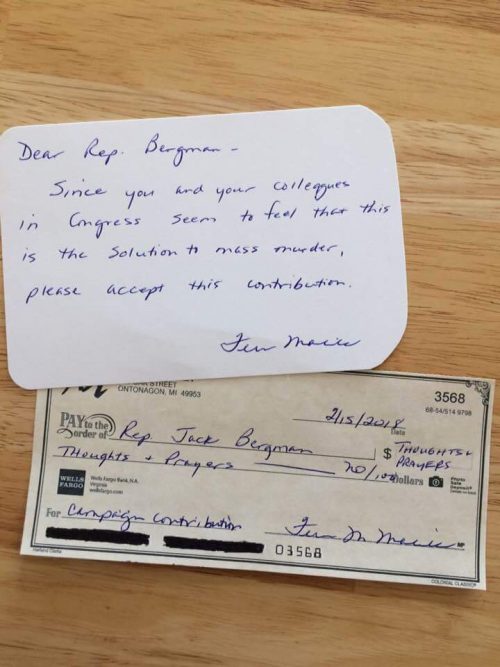I’ve known a few doomsday preppers — there’s even a TV show about them, and it’s part of the Mormon ethos — and they’ve always seemed tawdry and lacking in forethought, for all their obsession with an apocalyptic future. Let’s stockpile a 5 year supply of dried beans! Make sure you get the really good camping gear from REI! It’s as if they can sort of vaguely imagine a transition into chaos, but rather than adapting to it or building new cooperative institutional structures, they plan to ride it out by burrowing into their basements and chowing down on stockpiled canned goods until the crisis is over and they can re-emerge into their nice suburban tract home and resume watching TV. Armageddon will be a blip that will briefly derail their workday, but won’t perturb them much as long as they’ve mastered the art of canning pickles.
And then there are the macho American rednecks who fantasize about the fall of civilization, because then there will be no one to tell them that they can’t haul out their armory and run around shooting people — in fact, the path to glory and power will consist entirely of racking up the most kills, gunning down the weak and becoming the chief warlord. The more realistic end-of-the-world novels (The Postman comes to mind) recognize that the real danger that follows catastrophe is that kind of asshole, who will compound the problems and demolish the emerging social structures needed for humanity to recover. Although, I don’t know — maybe the endlessly repetitious, boring kill-and-be-killed chaos of The Walking Dead is more realistic…humans might just end up wandering from settlement to settlement, blowing them up and scattering violence further, hacking and slashing until blessed extinction comes.
They’re all thinking small, though. If you’re an obscenely wealthy Silicon Valley vampire, you have to dream big and wallow in the grand deadly visions of this book, The Sovereign Individual: How to Survive and Thrive During the Collapse of the Welfare State. Mark O’Connell summarizes the book.
It presents a bleak vista of a post-democratic future. Amid a thicket of analogies to the medieval collapse of feudal power structures, the book also managed, a decade before the invention of bitcoin, to make some impressively accurate predictions about the advent of online economies and cryptocurrencies.
The book’s 400-odd pages of near-hysterical orotundity can roughly be broken down into the following sequence of propositions:
1) The democratic nation-state basically operates like a criminal cartel, forcing honest citizens to surrender large portions of their wealth to pay for stuff like roads and hospitals and schools.
2) The rise of the internet, and the advent of cryptocurrencies, will make it impossible for governments to intervene in private transactions and to tax incomes, thereby liberating individuals from the political protection racket of democracy.
3) The state will consequently become obsolete as a political entity.
4) Out of this wreckage will emerge a new global dispensation, in which a “cognitive elite” will rise to power and influence, as a class of sovereign individuals “commanding vastly greater resources” who will no longer be subject to the power of nation-states and will redesign governments to suit their ends.
It’s a wealthy libertarian fantasy, and it’s just as much a fantasy as any bad apocalyptic novel. It’s the same structure. There will be a mighty disaster, all the people you don’t like will suffer and be slaughtered (but they don’t matter), while you hold the secret to survival, be it canned beans, bigger guns, or a ranch in New Zealand, and will emerge unscathed, and even stronger than before. They all rely on a disgust with the current order — the Mormons wanted godlessness and sin swept away to clear the path to an LDS theocracy, but it takes a libertarian to see roads and hospitals and schools as the worldly evil that must be destroyed. They all imagine an emergent New Order with themselves at the center, in this case a “cognitive elite”. How do you know they’re a cognitive elite? Because they have lots and lots of money. As we all know, wealth is always a sign of merit.
O’Connell’s story is all about the Arch Vampire, the selfish villain, Peter Thiel. He’s getting ready for the end of the world by modeling his world view on two fictions, as the “Cognitive Elite” do, The Sovereign Individual and The Lord of the Rings (there must also be a third, the works of Ayn Rand, but they aren’t mentioned in this article), and so he must of course buy up land for a bolt-hole in New Zealand. It’s remote, it’s beautiful, Peter Jackson filmed his Tolkien movies there, so it’s perfect. All the cool entrepreneurs who have profited off the information economy are eager to strip the current system bare so they can move on to the next fertile field, which they will strip bare to fuel their next assault. Sorry, New Zealand, it’s your fault for looking so lovely and attracting all the parasites.
The story discusses a sort of art installation, a set-piece game called the Founder’s Paradox that illustrates how the Thiels of the world operate.
The aim of Founders, clarified by the accompanying text and by the piece’s lurid illustrations, was not simply to evade the apocalypse, but to prosper from it. First you acquired land in New Zealand, with its rich resources and clean air, away from the chaos and ecological devastation gripping the rest of the world. Next you moved on to seasteading, the libertarian ideal of constructing manmade islands in international waters; on these floating utopian micro-states, wealthy tech innovators would be free to go about their business without interference from democratic governments. (Thiel was an early investor in, and advocate of, the seasteading movement, though his interest has waned in recent years.) Then you mined the moon for its ore and other resources, before moving on to colonise Mars. This last level of the game reflected the current preferred futurist fantasy, most famously advanced by Thiel’s former PayPal colleague Elon Musk, with his dream of fleeing a dying planet Earth for privately owned colonies on Mars.
The libertarian ideal is unregulated rapaciousness followed by moving on and abandoning what they’ve destroyed. It’s a locust’s dream. It’s what short-sighted opportunists fantasize about. Even some scientists are susceptible to it. If Earth becomes a dying planet, it’s because the greed of humans killed it…and in particular, the billionaires who think sucking the world dry is just fine because they’re planning to escape it. We have to recognize that the end game of capitalism is self-destruction.
All I can say is, if you meet the Sovereign Individual on the road, kill him. It’s a moral imperative.






